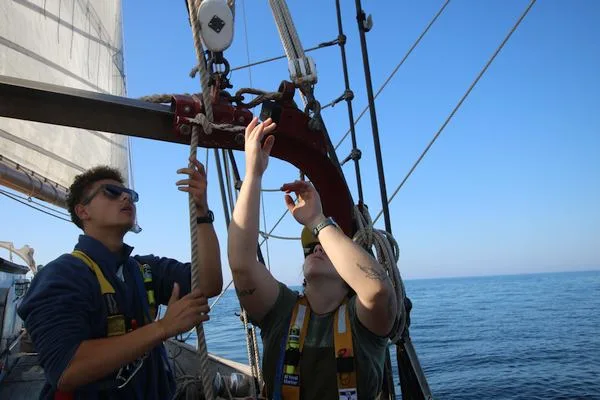Programs Blog
Four Lowers on the way to Nova Scotia

Author: Kara Baird ‘20
Ship’s Log
Monday, October 9th 2023
Noon Position: (Lat and Long): 42°46.905’N X 068°54.749’WShip Heading (degrees): 110°Log (nm): 370.2Weather / Wind / Sail Plan (from 1300 Watch Change): BF 4, SW wind withmain, main stay’sl, fore stay’sl, jib setDescription of location: (e.g. 10 nm SE of Georges Bank): Gulf of Maine,southern area of Cashses Ledge
A little introduction for this narrative. Chief Scientist Jeff Schellrequested a crew log entry, so I volunteered. My name is Kara Baird and I ama Program Assistant for Ocean Classroom. I have been living with thestudents on campus since their program started and have shifted into adeckhand role on board the Cramer. I graduated from Proctor Academy in 2020and was an Ocean Classroom student aboard Roseway in 2019. I have beensailing tall ships since my Ocean Classroom and am so excited to facilitatethe same environment for the students that I once had.Today was a hefty day for C Watch, but they stood up to the challenge! Wehad dawn watch (0100-0700) and night watch (1900-0100). The students havebeen practicing their skills in lab with a nighttime meter net deploymentand many hundred counts. Their skills in navigation are advancing as theyare plotting dead reckoning and accounting for set and drift on a paperchart. I don’t spend much time in lab as I am deckhand, but I am soimpressed with the work I have been able to see. The students’ knowledge hasexpanded from struggling to draw copepods in the on shore lab, to being ableto spot them in seconds in Cramer’s lab. Throughout the watches, studentswere given challenges and always rose up to the task at hand. We struck andfurled the main’sl and jib in less than 30 minutes. Again, so amazed bytheir quick progression!One thing I valued on my Ocean Classroom was the ability to be present. Wemust always be observing how the environment around us impacts our sails,the vessel, and our own person. We also have time to be less focused offwatch and are able to enjoy time on deck with our shipmates. Because we arein an environment built on thoughtful actions and little distraction fromthe outside world, we are able to strengthen our community and ourselves.Students are playing cards, reading books, learning instruments, takingnotes in their Sheet Anchors. They are constantly growing and asking toabsorb more. It is truly a pleasure to be a part of the unique communitythat Ocean Classroom builds and see how SEA’s focus on science strengthensit.Best,Kara Baird ‘20Program Assistant, C Watch
Recent Posts from the Ships
- Ocean Classroom 2024-A collaborative high school program with Proctor Academy
- Collaborations and Long-term Commitments: SEA’s Caribbean Reef Program Sets a Course for Coastal Programs that Compliment Shipboard Experiences.
- Sea Education Association students prepare for life underway using state of the art nautical simulation from Wartsila Corporation.
- SEA Writer 2022, Magazines From the Summer SEA Quest Students
- Technology@SEA: Upgrades Allow Insight into Ocean Depths
Programs
- Gap Year
- Ocean Exploration
- High School
- Science at SEA
- SEA Expedition
- SEAScape
- Pre-College
- Proctor Ocean Classroom
- Protecting the Phoenix Islands
- SPICE
- Stanford@SEA
- Undergraduate
- Climate and Society
- Climate Change and Coastal Resilience
- Coral Reef Conservation
- Marine Biodiversity and Conservation
- MBL
- Ocean Exploration: Plastics
- Ocean Policy: Marine Protected Areas
- Oceans and Climate
- Pacific Reef Expedition
- The Global Ocean: Hawai'i
- The Global Ocean: New Zealand